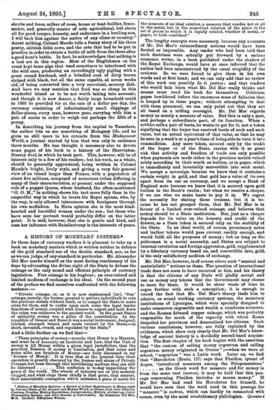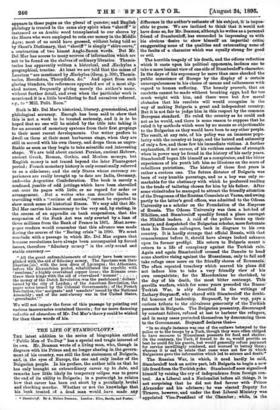A HISTORY OF MONETARY SYSTEMS.* IN these days of currency
warfare it is pleasant to take up a book on monetary matters which is written neither in defence of the gold standard nor of the double standard, nor, as far as we can judge, of any standard in particular. Mr. Alexander Del Mar marks himself as the most daring reactionary of his time by advocating the divine right of the State to debase the coinage as the only sound and efficient principle of currency legislation. Free coinage is his bugbear; an over-valued and limited medium of exchange is his ideal. On the second page of the preface we find ourselves confronted with the following sentence :—
"Private coinage, or, as it is now euphemised [sic], 'free' coinage, namely, the license granted to private individuals to coin the precious metals without limit, or to compel the State to make coins for them, and to confer upon such coins the legal tender functions of money, coupled with license to export and melt down the coins, was unknown to the ancient world. In the great States of antiquity money was a pillar of the constitution. In the republics of Greece and Rome it was a social instrument, designed, limited, stamped, issued, and made current by the State,—in short, invented, owned, and regulated by the State."
And a little further on we find that— "These principles of money—namely, that Money is a Measure, and must be of necessity an Institute and Law, that the Unit of money is All Money within a given legal jurisdiction, that the practical Essence of money is Limitation, and that coins and notes alike are Symbols of Money—are fully discussed in my 'Science of Money.' It is true that at the present time their operation is greatly obscured by the license and abuse of Private Coinage, but even through this bewildering medium they can still
be discerned This confusion is to-day imperilling the peace of the world. The wheels of industry are at this moment clogged, and what clogs them chiefly is that gross, that sensual, that materialistic conception which mistakes a piece of metal for
* History of Monetary Systeins: a Record of Actual Ek-periments in Money made Gn Various States of the Ancient and Modern World, as Drawn from their Statutes, Customs, Treaties, Mining Regulations. Jurispr ad 671.03, History, Archzology, Coir.s, Nummulary Systems, and other Sourees of Information. By Alesander Dal Mar, M.E. London: Effingham Wilson.
the measure of an ideal relation, a measure that resides not at all in the metal, but in the numerical relation of the piece to the set of pieces to which it is legally related, whether of metal, or paper, or both combined."
The lengthy excerpts were necessary, because any accounts of Mr. Del Mar's extraordinary notions would have been flouted as impossible. Any reader who had been told that
such doctrines were actually put forward by a serious economic writer, in a book published under the shadow of the Royal Exchange, would have at once inferred that the author had been misconstrued by the usual stupidity of the reviewer. So we were forced to give them in his own words and at first hand ; and we can only add that no review of this work can possibly do it justice ; and that readers who would fain learn what Mr. Del Mar really thinks and means must read his book for themselves. Criticism gapes bewildered before the enormous mass of fallacies that is heaped up in these pages ; without attempting to deal with them piecemeal, we can only point out that they are all based on a trifling oversight. Mr. Del Mar regards money as merely a measure of value. But this is only a part, and perhaps a subordinate part, of its function. When a cobbler sells a pair of boots, he wants to get for it, not a token signifying that the buyer has received boots of such and such value, but an actual equivalent of that value, so that he may be sure in a week's or a year's time of being able to turn it into commodities. Any mere token, secured only by the credit of the buyer or of the State, carries with it so great risk that activity and freedom of trade are only possible when payments are made either in the precious metals valued solely according to their worth as bullion, or in paper, which is immediately and invariably convertible into such metal. We accept a sovereign because we know that it contains a certain weight in gold, and that gold has a value of its own apart from its use as currency, and we accept a Bank of England note because we know that it is secured upon gold bullion in the Bank's vaults ; but when we receive a cheque, if we are wise we make haste to pay it in. We regret the necessity for stating these truisms, but it is be- cause he has not grasped them, that Mr. Del Mar is in favour of a limited over-valued coinage, and believes that money should be a State institution. But, just as a cheque depends for its value on the honesty and credit of the drawer, so a State token is secured only on the stability of the State. In an ideal world, of course, promissory notes and leather tokens would pass current readily enough, and would fulfil all the purposes of money ; but as long as the policeman is a social necessity, and States are subject to internal revolution and foreign aggression, gold, supplemented by a fiduciary currency based on, and convertible into, gold, is the only satisfactory medium of exchange.
Mr. Del Mar, however, is of course above such "sensual and materialistic" notions as these. The question of international trade does not seem to have occurred to him, and his theory is that the citizens of any State will gladly accept and use as money any tokens that the Government may choose to issue for them. It would be sheer waste of time to argue further with such a conception ; it is enough to record the fact that Mr. Del Mar's theory leads him to admire, as sound working currency systems, the monetary institutions of Lycurgns, which were specially designed to make commerce impossible and wealth a cumbrous nuisance, and the Roman debased copper coinage, which was probably responsible for much of the rapacity with which Rome despoiled her provinces and demoralised her citizens. Such curious conclusions, however, are fully explained by the evidences, which show very clearly that Mr. Del Mar's know- ledge of ancient history is a decidedly second-hand acquisi- tion. The first chapter of his book begins with the assertion that "the custom of calling money argentura and calling argentum money originated in Greece" ;—when we were at school, " argentum " was a Latin word. Later on, we find that " Herodotus (Erato, 127) says that Pheidon, tyrant of Argos, 'introduced measures among the Peloponnesians ' as the Greek word for measure and for money is from the same root (nomos), it may be held that this pas- sage concerning Pheidon includes or means money." If Mr. Del Mar had read his Herodotus for himself, he would have seen that the word used in this passage for " measure " is metron, which can hardly be connected with names, even by the most revolutionary philologiam Quzstcn i
appears in these pages as the plural of quxstor, and English philology is treated in the same airy spirit when " sheriff " is
instanced as an Arabic word transplanted to our shores by the Moors who were employed to coin our money in the Middle Ages ; most of us could have guessed, without being told so by Skeat's Dictionary, that " sheriff " is simply " shire-reeve," a contraction of two honest Anglo-Saxon words. But Mr. Del Mar has access to many sources of information which are not to be found on the shelves of ordinary libraries. Themis- tocles has apparently written a historical, and .rEschylus a geographical, treatise. At least we are told that the mines of Laurium "are mentioned by 2Eschylus (Geog. p. 399), Themis- tocles, Herodotns, Thucydides, &c." And apart from such glaring blunders, the references appended are of a most slip.
shod nature, frequently giving merely the author's name, without further detail, and even when the particular work is
mentioned it is a little bewildering to find ourselves referred, e.g., to "Mill. Polit. Econ."
Such is Mr. Del Mar's historical, literary, grammatical, and philological accuracy. Enough has been said to show that this is not a work to be treated seriously, and it is to be hoped that no one will be misled by the title into taking it for an account of monetary systems from their first gropings to their most recent developments. Our writer prefers to dwell on them at their most barbarous stage, when they are still in accord with his own theory, and drops them as unpro- fitable as soon as they begin to take scientific and interesting shape. We are told about ancient Persian, ancient Hebrew, ancient Greek, Roman, Gothic, and Moslem moneys, but English money is not traced beyond the later Plantagenet period ; French monetary history is only occasionally referred to as a side-issue; and the only States whose currency ex- periences are really brought up to date are India, Germany, and—the Argentine Confederation. The book is merely a confused jumble of odd jottings which have been shovelled out over its pages with little, or no regard for order or arrangement. But a writer who can describe Galba as travelling with a "retinue of monks," cannot be expected to show much sense of historical fitness. We may add that Mr. Del Mar carries his inaccuracy to the very end, by stating, in the course of an appendix on bank suspensions, that the suspension of the Bank Act was only averted by a loan of three millions from the Bank of France in 1891. Most news- piper readers would remember that this advance was made during the course of the "Baring crisis" in 1890. We must conclude with a passage in which Mr. Del Mar argues that b.Tause revolutions have always been accompanied by forced issues, therefore "fiduciary money" is the only sonnd and stable currency :—
" Ail the great enfranchisements of society have been accom- plished with the aid of fiduciaty money. The Spartans won their liberties [sic] with the iron discs of Lycurgus ; the Athenians, before the Alexandrian period, rehabilitated the republic with nomisma,' a highly overvalued copper issue ; the Romans over-
threw their kings with the aid of cvervalued nummi' the money of the Dutch Revolution was the pasteboard.' dollars' issued by the city of Leyden ; of the American Revolution, the paper notes issued by the Colonial Governments ; of the French Revolution, the assignats ' and mandats ' issued by the National Assembly ; and of the anti- slavery war in the United States, 'greenbacks.'"
We will not impair the force of this passage by pointing out various inaccuracies contained therein ; for no more damning reductio ad absurdum of Mr. Del Mar's theory could be wished
for than these words of his.



































 Previous page
Previous page